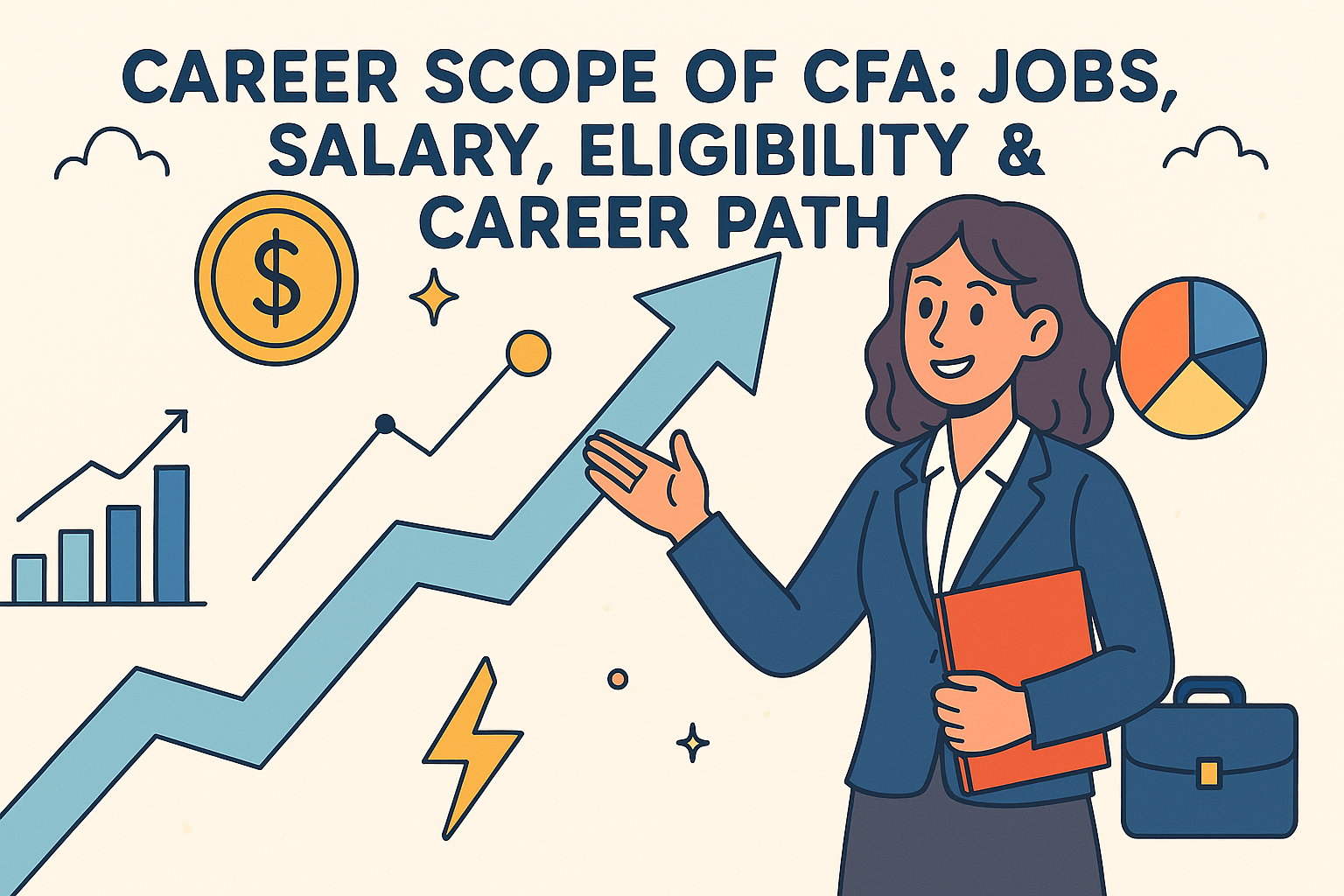The Chartered Financial Analyst, or CFA, remains one of the most respected and in-demand financial qualifications in 2025, especially in the Indian context. It is a qualification that provides access to many exciting and international career opportunities in investment banking, portfolio management, risk management, and financial advisory.
In this blog, we will explore some of the opportunities that CFA has to offer in 2025, the best academic streams you should take if you want to pursue a CFA after you complete the 12th commerce, and finally, if you are considering CFA after completing your undergraduate degree in BCom (Hons.) how a CFA would benefit you!
The Best Academic Stream After 12th Commerce to Pursue CFA
If you are aspiring to become a CFA charterholder, then it is imperative that you choose the right academic stream after your 12th commerce.
The CFA program states you need to have a bachelor’s degree or be completing your final year of college in order to register and complete the Level 1 CFA exam. Therefore, a person cannot simply pursue the CFA license directly following the completion of 12th. The best academic streams after the completion of 12th commerce to pursue a CFA include the BCom (Hons.) degree with a concentration in Finance or accounting. These degrees cover most of the core subjects related to CFA syllabus.
A BBA in Finance equips you with useful skills in business and money management. Economics or Statistics really enhance your analytic skills, which certainly come in handy while working towards a CFA designation. Professional certifications such as Chartered Accountancy (CA) or Company Secretary (CS) further strengthen the foundation for CFA preparation (see here). Choosing your degree from a commerce or finance-related area is an ideal choice and one that best prepares you for the process of achieving a CFA designation.
What Does CFA Offer After BCom (Hons.)?
If you have a BCom (Hons.) or degree in a similar area and achieve a CFA qualification, your career opportunities grow tremendously. You will find positions available for Investment Analyst, Portfolio Manager, Risk Manager, Equity Research Analyst, Financial Consultant, and Investment Banker, among others. These roles are in demand across banks in India, asset management companies, insurance firms, and new fintech firms. Having a CFA designation above your BCom degree separates you in the job market and can magnify your career paths.
Overview of CFA Exam Levels
| LEVEL | FOCUS AREA |
|---|---|
| LEVEL 1 | Investment Tools & Ethics |
| LEVEL 2 | Asset Valuation |
| LEVEL 3 | Portfolio & Wealth Management |
Each level builds your knowledge step-by-step, preparing you for a broad range of finance roles (detailed syllabus).
Career Paths and Salary Trends for CFA Holders in India
Here’s a glance at some popular career roles for CFA professionals along with typical salary ranges:
1. Investment Analyst: Roles pay between ₹8 to 12 Lakhs per annum and involve researching markets and analyzing data.
2. Portfolio Managers: Earn ₹12 to 30 Lakhs managing investments and client portfolios.
3. Equity Research Analysts make ₹7 to 15 Lakhs analyzing companies and stocks.
4. Risk Managers earn ₹10 to 20 Lakhs identifying and managing financial risks.
5. Financial Consultants advise clients on money matters with salaries of ₹9 to 18 Lakhs.
6. Senior roles include Chief Investment Officers with ₹40 Lakhs+.
7. Hedge Fund Managers: Handle complex portfolios earning ₹30 to 50 Lakhs.
8. Investment Bankers facilitating mergers or capital raising earn ₹25 to 40 Lakhs (highest paying CFA jobs).
Fees and What You Will Study in the CFA Program
To pursue CFA, you’ll typically pay an enrollment fee of about $450 (one-time) plus exam fees between $700 and $1,000 per level depending on when you register.
The program is divided into three stages:
1. Level I covers basics including ethics and quantitative methods;
2. Level II focuses on asset valuation and complex analyses;
3. Level III centers on portfolio and wealth management.
You study corporate finance, equity, fixed income, derivatives, and alternative investments. This extensive syllabus equips you for the demands of the finance profession fees and syllabus.
The Power of Combining an MBA with CFA
You’ve got the best of both worlds if you pursue an MBA by adding to your CFA. The combination of both will enhance your career and salary prospects, particularly in managerial roles in investment banking, private equity, and portfolio management. In India, the starting salary for an MBA + CFA is often around ₹15 lakhs a year, and typically increases rapidly with experience.
Your Journey Forward with CFA
Generally, it takes 3-4 years to achieve CFA designation, which includes passing three levels of exams and work experience. You may start as a Research Analyst or Financial Consultant, advance to Portfolio Manager or Senior Analyst, and continue career advancement to the highest roles such as Chief Investment Officer. The industries continue to embrace trends such as sustainable investing, artificial intelligence, and fintech, among others, which means CFA will continue relevant and thriving into the future
FAQs
1. Who is eligible to take the CFA exam?
Ans: An individual must hold or be in final year of a bachelor’s degree, or alternatively, have qualified work experience
2. Is CFA a worthwhile career in India?
Ans: Yes, it is highly regarded and will lead to high-paying career prospects.
3. After entering the CFA field, what is the average salary?
Ans: Entry-level positions start at around ₹4-7 lakh per annum, while a charterholder with 5+ years of experience can expect compensation of ₹15-50 lakh
4. Is the CFA certificate recognized globally?
Ans: Yes, CFA is recognized and valuable globally.
5. What companies employ CFA holders?
Ans: Major investment banks, consulting firms, asset management firms, etc, as well ad fintechs start-ups.
6. What is the highest compensated level position for CFA?
Ans: Chief Investment Officers generally receive the highest compensation nationally.
7. Is previous work experience required?
Ans: Yes, you do require around 4000 hours (3 years of qualifying experience) prior to obtaining your charter.

